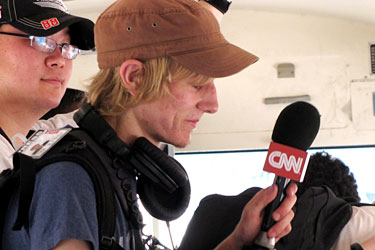Learn More About PUC
Student Produces "Taking Haiti Home"
By Lainey S. Cronk on June 11, 2010
Share this

"Taking Haiti Home," young filmmaker Tim Wolfer's first major production, tells a story from on the ground in a post-earthquake Haitian orphanage called La Maison des Enfants de Dieu.
Wolfer was in the middle of the school year as a film and television student at Pacific Union College when the earthquake hit Haiti. Wolfer posted a note on Facebook asking who would sponsor him to go to Haiti… and packed his bags. Now, people often ask him why that was his response. "I honestly don't know," he says. Wolfer had the background for such an adventure, though: He's filmed internationally for humanitarian projects, starting about two years ago when Maranatha Volunteers International, a non-profit that coordinates construction of urgently needed buildings, invited him to do film work in Mozambique. He's also done film work for the Seventh-day Adventist World Church as well as small non-profits, taking him to four countries in Africa, a couple in South America, and Bangladesh.
So eight hours later when an anonymous donor funded Wolfer and a friend's flight, it wasn't entirely outside his realm of experience. "All those other experiences helped me build up to this one," Wolfer says. Four days later they were on their way, but they had no idea where they would go when they arrived. Just before leaving, someone handed Wolfer contact info for Greg Constantino, the secretary/treasurer of For His Glory Adoption Outreach, an organization that partners with La Maison des Enfants de Dieu. Constantino gave his permission for them to stay at the orphanage.
At La Maison, Wolfer began filming and captured many elements of the general situation in Haiti following the quake, as portrayed through the experiences of the orphanage children and staff. Wolfer began to focus on the story of one girl in particular, an older child named Saintania whose parents had given her up to the orphanage. Her mother was sick, and the family had 10 children and lived in a rough neighborhood. Wolfer captured the story of Saintania and her biological family as well as her adoptive family waiting for her in Ohio.
In the meantime, the film follows the orphanage staff, led by Constantino's wife, Tawnya, as they try to figure out how they can get humanitarian visas to get 135 children out of their outdoor camp where failing supplies and security challenges are threatening. In the end, they finally get 80 children who have specific families waiting for them onto a military plane, and Wolfer travels with them to Orlando.
When Wolfer did a test screening of the very-nearly-completed film at the Cameo Cinema in St. Helena, California, in early June, the audience got an even more personal perspective: Wolfer brought Greg and Tawnya Constantino with him to the stage for a lengthy and thought-provoking Q&A. Wolfer stays in close contact with them, and when he let them know he was doing a test screening of the film in St. Helena, they flew in from Utah to be there. It was the first time they'd seen the documentary themselves, and they were impressed with the result of the work of the random film student who had shown up at their orphanage in January.
The discussion included media coverage of such stories, since both Fox and CNN did coverage of La Maison trying to get the kids out of the country and Wolfer actually filmed some of the live broadcasts taking place. Another topic was how the orphanage was impacted by the huge (negative) publicity given to another group, who was trying to take undocumented children from the country; Greg provided some insights into that publicity as well as background on the situation with huge numbers of orphans, mostly undocumented, and the sometimes conflicting questions of getting them out of a potentially stilting institutionalized life and into adoptive homes, but of removing them from their native culture in the process.
Others asked what was next for Wolfer, who hopes to enter "Taking Haiti Home" in film festivals and also says "I'd like to catch up with Saintana." He also has letters she wrote to her parents in Haiti and would like to be able to go back and deliver them. Wolfer, who's headed to Andrews University in Michigan, finds he has a taste for this kind of filming, appreciating "the fact that I get to travel, the people I get to meet, the different cultures I get to experience." The Haiti adventure, he says, "wasn't as crazy as it might seem to a lot of people," but he adds that it "was definitely the most extreme thing I'd ever done."
During the Q&A, one student made a personal connection for the film and the audience when she asked, "How can we as college students, who can't go to Haiti or give a lot of money, do to help?" The Constantinos mentioned summer mission trips and the orphanage's upcoming building project, but Tawnya added, "It doesn't always have to be money. If this changes you, makes you care more… maybe it will affect how you use your resources later, or how you influence other people." While there's no single answer, she says, there are just "a lot of people trying to do the little they can," and impacting a few lives can add up to a big difference.
Latest News
Maxwell Scholar Feature: Liah Ronneburg
By Marina Maher on December 30, 2025
First Set of PUC’s North Coast Nursing Students Graduate
By Ally Romanes on December 23, 2025
Two Tonge Grants Awarded to M.A. in Communication and Aviation Program
By Marina Maher on December 22, 2025
PUC’s College Days Creates Lasting Connections
By Ally Romanes on December 18, 2025
